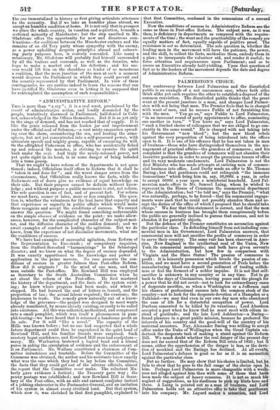"ADMINISTRATIVE REFORM."
'Tnis is more than "a cry"; it is a real want, proclaimed by the result of administrative action, and loudly demanded by the people, tentatively discussed in Parliament, half-denied in Cabi- net, acknowledged in the Offices themselves. But it is as yet only in the stage of demand, and has not reached that of supply. It is like the genie released from the leaden jar and imprisonment under the official seal of Solomon,—a vast misty emanation spread- ing over the shore, encumbering the sea, and loading the atmo- sphere, but not yet concentrated into a self-possessed power, with articulate speech and mighty grasp, capable of executing its will. So the affrighted Fisherman in office, who has accidentally fished up and released the monster, is striving to exorcise the spirit back under the seal. And truly the newly-released power, not yet quite right in its head, is in some danger of being befooled into a tame gossip. That we ought to have reform of the departments is not ques- tioned; indeed, Officialism itself offers to Reform that it shall be " taken in and done for " ; and the worst danger arises from the circumstance, that Officialism really knows the facts, while the Reformers out of doors give no evidence of equal knowledge on their side. But their purpose cannot be definite without know- ledge ; and without purpose a public movement is riot, not reform. The sole question is one of fact, and of present fact. For reform we must have, sooner or later, more or less complete. The ques- tion is, whether the volunteers for the lead have that capacity and that experience or sagacity in public affairs which would make them recognize and accept the conditions of success. We cannot answer the question. We might found something unfavourable on the simple absence of evidence on the point : we make allow- ances, however, for the complicated character of the subject-mat- ter, and the diffusive character of the sudden demand ; and we await examples of conduct in leading the agitation. But we do know, from the experience of not dissimilar movements, what are the conditions of success.
We have had examples of successful agitation, from Reform of the Representation to Free-trade ; of compulsory inquiries, from the Stafford-Beresford "harmonizings" to the Sebastopol disaster ; and we know on what the degree of success depended. It was exactly apportioned to the knowledge and power of application in the prime movers. No ease presents the con- ditions of success in greater fulness than Post-office Reform. How did it originate P In the mind of one man, and that man outside the Pest-office. Mr. Rowland Hill was employed as Secretary to the South Australian Commission when he set about the reform of the Post-office. He first mastered the history of the department, and the facts of the system exist- ing; he knew where progress had been made, and where it stopped. He had learned the cost of letters in transit, and the proportion of tax ; the actual labour required; the evasions; the hinderanee to trade. The remedy grew naturally out of a know- ledge of the grievance—the project was designed to meet wants already manifested, by means already existing, or easily to be called into existence. All this was collected, methodized, and compressed into a small pamphlet, which was itself a phenomenon in pam- phleteering—we have heard that it returned a handsome profit on its sale. For it sold "like a novel." The capacity of the Hills was known before ; but no one bad suspected that a whole future department could thus be engendered in the quiet head of Rowland Hill, and his familiar friends were surprised. Such mastery begat confidence, and Rowland Hill soon had coadjutors— many. Mr. Warburton bestowed a logical head and a liberal purse in aiding the circulation of evidence and the enforcement of it on Parliament. Mr. Wallace constituted a chairman of Com- mittee industrious and tractable. Before the Committee of the Commons was obtained, the author and his assistants knew exactly what was the case which they had to lay before the Committee, the facts that they could get out of the adverse officials, almost the report that the Committee must make. The reluctant Ma- berly gave evidence a fortiori ; the Treasury gave way ; the penny postage was established ; and now Rowland Hill is Secre- tary of the Post-office, with an able and earnest coadjutor instead of a jobbing obstructer in the Postmaster-General, and an imitation of his system in almost every civilized land. But that system, which now fa, was sketched in that first pamphlet, explained to that first Committee, confessed in the saanceesioxis of a coerced Executive.
Now the conditions of success in Administrative Reform are the same as those in Post-office Reform. The subject now, as it was then, is deficiency in departments as compared with the require- ments of the time ; the want and the practicability of the remedy are equally matters of fact, equally capable of positive proof. The resistance is not so determined. The sole question is, whether the leading men in the 'movement will have the patience, the power, and the skill, to collect the facts, methodize them, embody them in a plan ; to incorporate the volunteer aid, and render it useful; to force attention and acquiescence upon Parliament; and so to coerce an Executive already half-yielding. Upon that question of fact as to the leaders of the movement depends the date and degree of Administrative Reform.


























 Previous page
Previous page